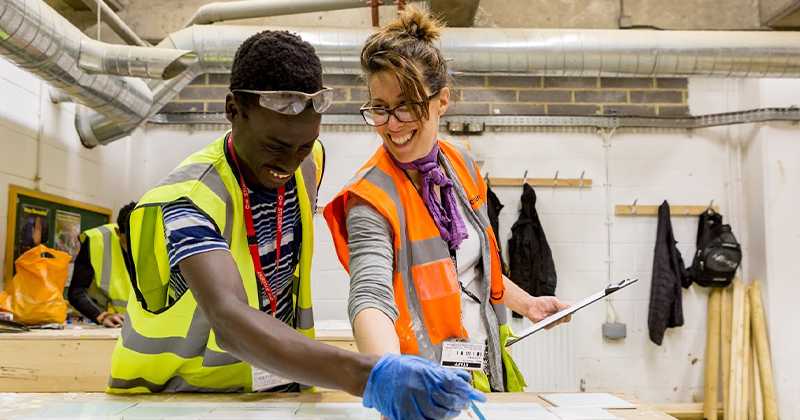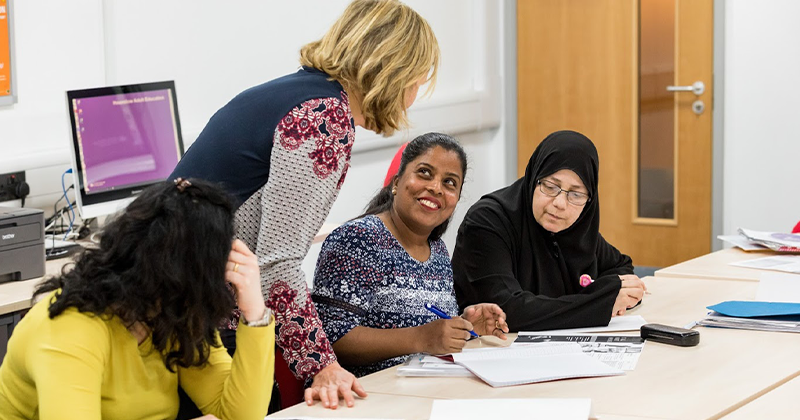As a Further Education (FE) teaching professional, your career is dedicated to guiding students through their learning and helping them develop skills to reach the next stage in their careers and their lives. While your primary focus may be supporting your learners to succeed, that doesn’t mean your own learning and development should take a back seat.
Access to valuable continuous professional development (CPD) is crucial, and this doesn’t become any less important as you progress through your career. But what are the options for advanced teaching professionals who want to demonstrate their mastery of teaching and challenge themselves to take their practice further?
Advanced Teacher Status (ATS) is a recognised professional status for advanced teachers, gained after successfully completing a 12-month period of professional development through the Society for Education and Training (SET). The status is maintained through membership of SET and through re-accreditation every three years.
Applications for the current ATS cohort are open until 31 August. Wondering what ATS has to offer and whether to apply? Here are five ways it can help take your teaching career to the next level.

Engage in new research to improve teaching
Practitioners complete a research project as part of undertaking ATS. This is a fantastic opportunity to explore innovative teaching methods and bring fresh perspective to your practice.
ATS alumni have explored a wealth of topics through their research projects. Molli Bennion, FE GCSE and Functional Skills Maths Lecturer at Preston College, focused on the use of technology in teaching as a result of the Covid-19 pandemic.
“My project was about assessing if Microsoft Forms was an effective blended learning tool for improving participation, because a lot of the students were just not engaging with online learning,” Molli explains.
Molli was able to see the direct impact of her research on learner engagement. “Participation went up by 33% so it definitely started to improve things. It meant that as a teacher, it made it easier for me to monitor to see who was making progress and who was not.”
Beyond the impactful results of the research, Molli found the improvement in her core research skills to be highly beneficial. “Doing ATS also made me a better researcher. Actively researching things for ATS made me realise how much it can help me develop my practice and teaching techniques.”

Gain recognition and confidence
Undertaking ATS further hones your teaching skills, but it also provides recognition of your status as an advanced teacher. Achieving ATS through a rigorous professional development programme demonstrates your mastery of teaching to colleagues and employers alike.
Jacqui Scott, Head of Teaching and Learning Standards at Riverside College, appreciates the recognition ATS grants senior and experienced teachers: “For experienced teachers, where there may be few or limited profession opportunities for them in colleges, ATS provides another way of rewarding them for all their efforts.”
Those who achieve ATS are also awarded Chartered Teacher Status. Ecaterina Bright, Senior Tutor/ICT at Haringey Adult Learning Service (HALS), explains how this recognition is an additional benefit: “Being awarded with Chartered Teacher Status was a bonus, especially because I thrive to be recognised for having evidence-informed, high-quality teaching practice, to maintain excellence in teaching and secure the best outcomes for learners.”
Many alumni have found that achieving ATS brought them renewed confidence in their practice. Peter Saban, Hostage Negotiator Development Manager in the Avon and Somerset Constabulary, summarises his positive experience: “I am really pleased I completed [ATS] because I enjoyed it, and personally, I got a lot from it. It’s made me feel more confident about my delivery and made me think differently about how I deliver.”
Lead change in your organisation by sharing your learning
Following their experience of ATS, many alumni have successfully implemented change across their organisations, sharing the learning from their research to drive improvements in teaching practice.
Oxana Nikitin, Maths Lecturer at East Surrey College (ESC), describes the impact of her learning on her organisation: “ATS gave me the opportunity to cascade my knowledge and professional skills among my peers, colleagues and organisation, and it allowed me to share my experiences and help others to develop their professional practices.”
Oxana details wider cultural changes within her organisation that were supported by ATS: “Undertaking ATS also helped towards the ESC’s goal as an organisation: to change the culture of teachers’ professional development towards a community of collaborative practice in which every practitioner is supported and able to reach their full potential.”
After undertaking ATS, Sally Richards, GCSE English Lecturer at Hartpury College, saw the impact of her learning within her department: “I have been able to share the results of my project and benefits of technology report with my colleagues, which has strengthened our department.”
Others found ATS provided a foundation for progression within their role. Molli Benion shares her own path of progression: “Since being awarded ATS I’ve been given more responsibilities; I’m getting PGCE students to mentor and I do a lot more cross-college working than I did before.”

Benefit your learners
Ultimately, honing your teaching practice and developing your own skills comes down to the same key goal: benefiting your learners. Many practitioners have seen the fruits of their labours in undertaking ATS realised in the form of more effective engagement with learners and better results in the classroom.
Sally Richards explains: “My teaching practice has changed because I am more reflective and critical. Being reflective on a regular basis allows me to improve my teaching from week to week. The critical way I can now read allows me to choose the most appropriate strategies and ideas for my students.”
Molli Benion shares how her research project on the use of Microsoft Forms as a blended learning tool has benefited students, even after they returned to physical classrooms following the Covid-19 lockdowns. “It’s been such a great success that we still use it in maths classes now that we’re back to teaching face-to-face, and engagement and participation is still very high.”
Challenge yourself
As a rigorous programme of work over 12 months, ATS is an opportunity to challenge yourself. Many alumni note that it requires hard work and dedication, but that this makes it all the more rewarding.
James Foster, Head of Academic Studies and Quality Improvement Manager at Weymouth College, admits that he initially underestimated how challenging ATS would be: “I found the reflection to be really good and I enjoyed the project, but I just didn’t expect it to be as demanding. During the process I would sometimes think to myself ‘why am I doing this?’, but then at the end when I finished the process and I got the award, it felt amazing and brilliant.”
Molli Benion shares her advice for meeting the demands of the programme: “Breathe! Ask for mountains of support and advice. Speak to peers on the programme. […] Speak with your mentor and your students, and constantly be in communication with other people to talk about how you’re doing, which way you’re heading, and to bounce ideas off.”
She concludes “ATS is a journey and it’s a process and everyone’s journey is different. Embrace change and enjoy it. I had a ball! It was hard but I loved it.”
Take the next step in your career today
If you’re interested in ATS, you can find out more about the eligibility criteria and apply today via the SET website. Applications close on 31 August 2023. Don’t miss this opportunity to boost your professional development and achieve recognition for your advanced teaching practice.

















Your thoughts